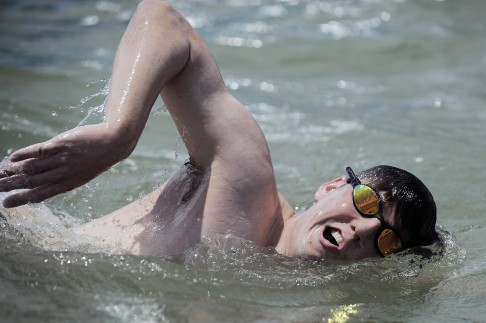
How mental toughness gives athletes the edge
Strength of mind proves useful in all areas of life
At a sudden-death play-off for first place in the World University Championships of golf earlier this year, Hong Kong amateur Tiffany Chan was staring defeat in the face. Watching her competitor sink a difficult putt, she knew she had to match her rival.
After four rounds of play, the two golfers were tied at 10-under-par 278 - and they had wowed the crowds, hole for hole. It all came down to a single shot. Chan took a deep breath, focused and holed a three-metre birdie putt for the win.
"I just told myself to keep calm, take one shot at a time and focus on the present moment," says the 20-year-old Tuen Mun resident. "I had to be tough - I had only one chance and I had worked hard for it."
Chan's fortitude in a moment of immense pressure is known in sports psychology as "mental toughness". A term championed by sports psychologist James Loehr in the early 1990s, mental toughness has since been recognised as the "X-factor" that gives winning athletes the edge over their competitors.
Despite its significance, health professionals and athletes still struggle to determine what being "mentally tough" means. "Mental toughness is a combination of a few traits like resilience and stoicism. It's about finding the opportunity in everything," says Laura Walsh, mental health counsellor and applied sports psychologist at LifeShift Hong Kong.
Walsh has first-hand knowledge of what being mentally tough requires. She competes in triathlons and international adventure races, which are multiday events covering 350 kilometres of mountain biking, kayaking, rope work, running and trekking.
Competing in the Canadian team during the Moroccan Eco-Challenge in 1999, she recalls being on the verge of physical and mental exhaustion from sleep deprivation and altitude sickness. "My stomach felt like it was in my knees and my eyeballs felt like they were being sucked back into my head because my head hurt so much. I was done."
Yet, she found the courage to continue. "After minutes of blubbering, I stood up and just started to put one foot in front of the other." The team finished seventh.
The "plough factor" Walsh speaks of - continuing regardless of physical discomfort - resonates with endurance swimmer Simon Holliday, who swam 35km last May, from Hong Kong to Macau, to raise awareness of plastics in the ocean. He completed the swim in a record 10 hours, 20 minutes, and 30 seconds.

"I always know that if I just keep swimming, then I will make it," says Holliday, a learning and development manager at a law firm. "It's about knowing you have control over certain events and how you react to those events." Adds Walsh: "Everyone suffers. It's how you deal with it that makes or breaks you."
Ultra runner Andre Blumberg also knows a thing or two about suffering. Next week, Blumberg, 44, will run a 321-kilometre race around Lake Tahoe in the US. He hopes it will take him 83 hours, with virtually no sleep. "Our physical limits are mostly an artificial perception we create in our minds," he says.
Blumberg says he prepares mentally for weeks before a race. "I print out the course and elevation maps and pin them on my bedroom wall, and look at them every day to envision what it will be like at various stages of the event," he says.
"I know it will be hard. I know it will hurt. But you have to embrace it. I will learn more about myself, and you need to push the envelope to do that."
Holliday believes being mentally tough is about delayed gratification. "At the one-hour mark of my swim, I just wanted to get out and go back to bed. [Being mentally tough] is about recognising you can't do that."
"Those who are successful don't just act upon their emotions, they defer those feelings for the ultimate reward - the sense of accomplishment at the finish," he says.
This "insatiable desire and internalised motive to succeed" as well as "an unshakeable belief in one's goals" were identified in a study of the leading attributes of a mentally tough athlete published in 2002 in the . Professor Graham Jones of the University of Wales studied 10 international sports performers, and made a list of 12 key attributes. These reflect the thoughts of Chan, Walsh, Holliday and Blumberg.
More recently, sports psychologists highlight the importance of positive self-talk in resilient athletes.
"Rescripting negative self-talk is an important first step to being mentally tough," says Adam Dehaty, a personal trainer at Pinnacle Performance, and a qualified sports psychologist with a master's in sport and exercise psychology.
"Our bodies listen to instructions from our brains. Whether you are an Olympic athlete, or someone just getting back into fitness, you will at some point leave your physical comfort zone. At this point, the internal dialogue starts."
I just told myself to keep calm, take one shot at a time and focus on the moment
When things get tough, Blumberg talks to himself: "I tell myself, this is what you came for. Enjoy it. Accept the challenge. There are definitely down moments, but I try to overcome the negative thoughts and not listen to the little devil in my head asking me to quit."
The "little devil" in your head is not just indicative of your success in sport. Recent research has found mental toughness is also a determinant of how successful you will be in life.
Professor Angela Duckworth, from the University of Pennsylvania, studied 2,441 military cadets in a training cycle known as Beast Barracks. This is designed to test the limits of cadets' physical, emotional and mental capacities.
She found that cadets who were one standard deviation higher on a "grit scale" (defined as "the perseverance and passion to achieve long-term goals") were 60 per cent more likely to finish Beast Barracks than their peers.
Duckworth found it was mental toughness that predicted whether a cadet would be successful, not their talent, intelligence or genetics.
The good news is you can develop your mental mettle for success. "Mental toughness is a dynamic process, and it can change daily, or due to the activity involved. Like any muscle, you can condition yourself to remain mentally tough through adversity," says Dehaty.
In sports psychology, becoming tougher has been broken down into a five-step process, he says. This involves being aware of your mental self-talk, stopping the negative chatter, restructuring your thoughts, countering with positive self-talk, and reflection.
Reflection on mental performance is a key step. Developing one's resolve is an ongoing process, according to a follow-up study by Jones published in the in 2008, which suggests athletes should undergo mental training as much as physical training.
Although all of these athletes believe sport is the perfect forum to hone their mental toughness, there are other options. "Any endeavour that requires you to squirm, or reach a little farther, will help," says Walsh.
"When things do not go your way, or you don't achieve what you want, it is the mental toughness that allows you to learn from the experience and move forward," Walsh adds.
But these athletes still believe sport is the best way to develop the quality. "Sport is a microcosm of life. Sometimes you win sometimes you lose; and there are times when you think you cannot keep going. But having mental toughness allows you to ride out the bad times, by putting one foot in front of the other," explains Walsh.
"As Rocky Balboa famously said [in the film ], it's not about how many times you get knocked down, it's about how many times you can stand back up again and keep going."
Five steps to positive self-talk
Awareness "Become aware of the content of your self-talk," says Adam Dehaty of Pinnacle Performance, a qualified sports psychologist.
"First of all, is it relevant to your challenge or are you distracted? If the self-talk is relevant take note of whether it is positive or negative. If it is positive, keep going. If it is negative it must change."
Thought stopping Once you become aware of negative self-talk, you must take steps to stop it immediately says Dehaty. "In competitive sport especially, you can't afford negative thoughts. They snowball quickly, and before you know it, you settle for a mediocre performance, stop or, worst of all, don't even start."
"Actions can aid 'thought stopping', and it's common for athletes to wear bands around their wrist to snap when a negative thought arises. This action suggests the concept "snap out of it".
Thought restructuring "Once you have stopped those negative thoughts, you must restructure them," he says. If you're hurt or injured, sometimes being mentally tough may not be the right response.
"Whatever the cause of the thought, it has to be approached in a positive light to move forward. Restructure the dialogue into positive self-talk. If you face superior opposition, say 'this is a great opportunity to see where I'm at. I'm going to make her play her best to beat me. I can make a name for myself.'"
Repeating the messages will help you remain positive.
Countering Keeping negative thoughts is the key to mental toughness, although it's not always easy. "Don't look at this skill as repressing thoughts through effort. It is important to be mindful of the negative thought, and the cause of it," says Dehaty.
"Once restructured into a positive statement, you need to counter the argument put forward by the doubt with a positive 'case', like a lawyer would do in court."
What's an example of a "positive case" or thought? "Memories from your past where you have performed well at a particular skill, a time you exceeded your perceived ability."
By presenting the case, you are essentially convincing yourself the original thought was irrational. "This will reduce the chances of it returning. It will also give your a positive outlook," Dehaty says.
Reflection After training or competition, Dehaty encourages athletes to reflect on their mental performance, and examine what negative thoughts were present.
"Take a note of any negative self-talk and start building your case against it immediately. Practice that skill, work on your fitness, research tactic, or opposition for the upcoming match, so if the thought does return you can bat it straight back out of the park," he says.
Rachel Jacqueline
